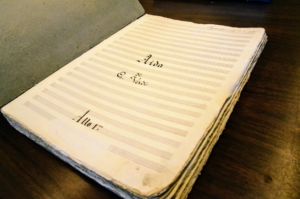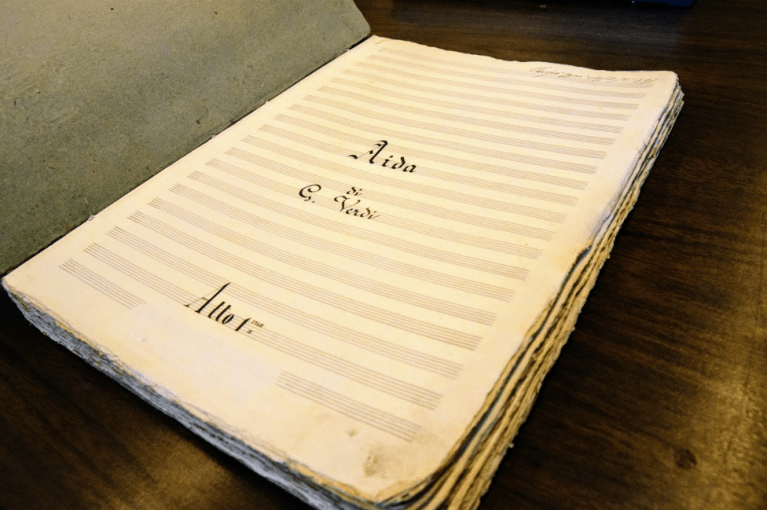What is believed to be the earliest surviving full score of the famous Verdi opera Aida currently resides in the Music Library here at Stanford. The 1876 manuscript has been analyzed closely here at Stanford last fall.

Written at the highest point of Verdi’s career, this opera follows the forbidden love and ensuing trials of Aida, a princess who has been captured by Egyptian forces, and Radamés, an Egyptian commander.
“Aida is the apotheosis of a Verdi opera,” said Heather Hadlock, associate professor of music. “It’s this perfection and cumulative demonstration of what Italian serious opera was at this time, just in terms of the lyrical beauty, the richness of the orchestration, the depth of emotion, and the monumental musical structure. It’s very pure.”
During Hadlock’s seminar, students analyzed the 1876 Aida score closely and compared it to other manuscripts to find any discrepancies. Unlike other operas which may change drastically over time, there were no large differences between earlier and later scores of this opera.
“What we did in my seminar was we compared this score to published editions and other hand-copied scores from the time. We were able compare it to one from the 1870s and another from 1880 and comb through and see how consistent the [copyists’ markings on the score are], or if there are things in this score that are hand-written in and reflect some kind of local decision on the spot,” Hadlock said. “We found they were very similar with some interesting discrepancies.”
A closer look at the scrawls written on the score reveals that this is not just a museum piece; it was once an actual active, working manuscript.
“Once it’s been used, then you have more layers of annotation because maybe the coach, the rehearsal pianist, the conductor might all be making these pencil marks, blue pencil marks, and little annotations in ink, so there’s layers and layers of human activity on each page,” Hadlock said.
This hand-copied full score originates from the 1876 Paris premiere of Aida conducted by Giuseppe Verdi at the Theatre-Italien, which also starred the singers whom he had originally cast in the roles. Complete with both orchestral and vocal instruction, the manuscript provides valuable insight into his highly successful opera.
The library secured this four-volume score of Aida through a Sotheby’s auction. Mimi Tashiro, music bibliographer for Stanford Libraries, noticed the listing for the rare full score in the catalog, bid on it with the approval of Stanford music professors and managed the logistics of obtaining the manuscript from the auction.
The amount of time and money poured into auctions for historical artifacts such as this manuscript inspires Stanford Libraries to choose its bids carefully.
“When we’re considering an auction, we’re looking for special things that are unique like this: one-of-a-kind kinds of things that present a good research situation like this one as an early performance,” Tashiro said.
Soon, Hadlock plans to compare the 1876 score to other versions of Aida in New York at the Verdi Institute, including the original autograph, which is the manuscript that Verdi first wrote himself.
Contact Jin Tuan at jin.tuan ‘at’ gmail.com.
